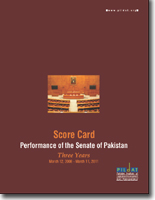From 2002 onwards, PILDAT has consistently looked at the performance of the Pakistan’s Parliament, reviewing it from the citizens’ perspective. Its annual reports have helped highlight critical areas of performance as well as that of required reform in the Parliament of Pakistan over the years. In keeping with the PILDAT tradition of compiling and disseminating reports on Parliamentary performance since 2002, this report looks at the performance of the Senate of Pakistan by looking at some of the main categories of legislative performance. Initially, the purpose of bicameralism (having two houses of the Parliament) was to achieve a mixed form of Government where the lower house is peoples house and the upper House (Senate) usually represents the interests of the upper classes. Another rationale for bicameralism is preservation of federalism. Under “federal bicameralism” the lower House is usually elected directly on the basis of population while the upper House ensures representation of states and provinces. More generally, bicameralism has now been associated with the protection of a majority against the minority and also the minority against the majority. Another important value that the upper House is associated with is of continuity. The upper House is not subject to dissolution, even when the lower House is dissolved, and election to whole upper House or Senate does not take place at the same time. This allows for the long-term policy making and greater continuity of membership. The Constitutions of 1956 and 1962 of Pakistan provided for a unicameral legislature. The 1973 Constitution allowed for a bicameral Parliament with a popular Chamber (National Assembly) and territorial Chamber (Senate). The Parliamentary form of Government in Pakistan has not evolved fully due to several military interventions and long periods of authoritarian rule. Although, according to the Constitution, the Senate cannot be dissolved, it was dissolved during the military rule of General Muhammad Zia-ul-Haq (Retd.) and General Pervez Musharraf. Therefore PILDAT believes that any assessment of the performance of the Parliament of Pakistan should be undertaken in the context of peculiar history of civilian and military rule in the country.
Score Card : Performance of the Senate of Pakistan : Three Years
March 12, 2008 to March 11, 2011







